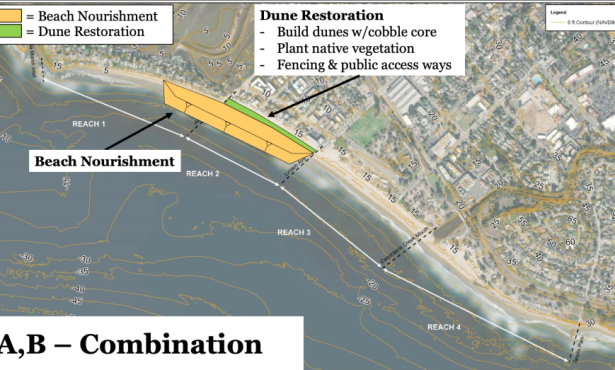LEED Certification for Ocean Walk Faculty Housing Project
U.S. Green Building Council Awards Leadership in Energy and Environmental Design certification for UCSB development
Ocean Walk is the first housing project in the University of California system to receive LEED for Homes certification.
Ocean Walk at North Campus is UCSB’s newest planned faculty housing community. It was created under the authority of the Board of Regents to provide affordable housing for faculty.
Situated on approximately 26.3 acres, Ocean Walk is about two miles from the main campus and about one-third of a mile from the beach. It is located south of Phelps Road and Cannon Green Drive, bordered on the west by Ellwood Mesa open space, and on the south by the Ocean Meadows Golf Course. Adjacent to 650 acres along 2.25 miles of Ellwood-Devereux coastline, public access is provided in accordance with the conservation of regionally significant coastal resources.
“Buyers at Ocean Walk will have the peace of mind that their new home has been built to a high green standard,” said Jordan Sager, UCSB’s LEED program manager. “This means that the project ranks among the top 25 percent of new homes incorporating best-practice environmental features.”
The features include:
Sustainable construction. The builder practiced methods of recycling and diversion of waste during the construction process. Extensive steps were taken to maintain a clean environment during construction, including erosion controls, water management, and mitigation of the debris entering waterways. Ocean Walk has been designed around natural resources. The open space has carefully been restored to protect the area’s biodiversity.
Energy efficiency. All homes will feature Energy Star-rated appliances. On average, homeowners will save approximately 40 percent on monthly energy bills. Additionally, each home has undergone thorough inspection and performance testing to ensure the highest performance of building systems, including extensive post-installation performance testing of insulation, ventilation, heating systems, high-efficiency appliances, fixtures, and windows.
Water conservation. The project has been designed with high-efficiency water fixtures and smart irrigation systems. Additionally, the landscape design includes native and drought tolerant plant species, to promote biodiversity in the surrounding ecosystem and to reduce the need for pesticides.
Indoor environmental quality. All design specifications for the interior finishes (carpeting, paints, adhesives, and finishes) are non-toxic. Additional moisture control measures were designed into the homes to help achieve a high level of indoor air quality.
While Ocean Walk is the first UCSB housing project to receive LEED recognition, there are 12 other buildings on campus that have received LEED certification. Earlier this year, the Marine Science Research Building received LEED Gold certification (Existing Building); Kohn Hall received LEED Silver (Existing Building) status; and the Materials Research Laboratory received LEED certified status. In 2010, the Life Sciences Building and Harder Stadium Office Building were awarded LEED Silver (Existing Building) certifications, while a new complex that includes the Social Sciences & Media Studies Building, the Gevirtz Graduate School of Education, the Koegel Autism Center, and the Hosford Counseling Clinic received LEED Silver (New Construction) certification. Also in 2010, an addition to Engineering II received LEED Gold (New Construction) certification.
In 2009, the San Clemente Villages graduate student housing complex received LEED Gold certification in the New Construction category. Bren Hall, home of the Bren School of Environmental Science & Management, became the first building in the country to receive double LEED Platinum certifications — in the New Construction (2003) and Existing Building (2009) categories.
In 2005, Girvetz Hall became the first building at UCSB to be certified in the LEED Existing Building category. It achieved a LEED Silver rating, becoming the first LEED for Existing Building project in the UC system. In 2008, the Student Resources Building received LEED New Construction Silver certification, while the Recreation Center received LEED Existing Building Silver certification.
In 2002, UCSB adopted a campus policy stating that all new buildings commissioned after July 1, 2004, must meet a minimum of LEED Silver. In 2010, the Chancellor’s Sustainability Committee established an interim policy that all buildings commissioned after July 1, 2010, must meet a minimum of LEED Gold

